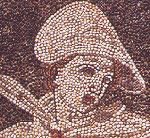As you can see from the length of this post, I have given the subject of naming characters a little more thought since it was discussed in the comments of a previous post. I've recorded here some of my preliminary recommendations for naming characters — subject to revision and addition, of course.
I mentioned earlier that Rowling does names well. My partner happens to be a devoted fan of the Harry Potter series, and he tells me that Rowling has been collecting names for years. It's one of her passions. Well, that explains things a bit. I'll take her cue and try to be more aware of the names I see and hear every day. That's my first rule of naming: collect them.
In general, I think that a name should not try to do too much. For example, had the hero of The Fountainhead been named, say, Remington Holloway VI, readers would assume that he is privileged, well-raised, well-educated, and driven by family to succeed. However, the theme of The Fountainhead demands that the hero make the name, not the other way around, so the name Howard works fine. It's neither distinctive nor mundane. We remember the name only because the character is so powerful.
Conversely, sometimes a name does in fact convey something about the character. The name Dumbledore, for example, perfectly conveys the gentle, paternalistic, maybe a little mysterious and unconventional head wizard in Harry Potter. Dumbledore lives up to his name; thus, the name aptly conveys the man. We could even say that the name itself helps to characterize him right from the start, and it does so very economically.
However, I think that overt connotations are best avoided. The word “Mal” and its variations, for example, have been used to death in Fantasy as the name of the Big Bad Dude. Because the word obviously comes directly from the Latin word for “bad”, this is just cheating. That's why George Lucas gets an “A” for coming up with such creative names as Darth Vader and Emperor Palpatine but only a “C-” for Darth Maul. For the same reason, no architect should ever be named Steel, no hunter Remington, no teacher Miss Apple, and so on. Such obvious allusions work only in porn films—and even there I'm not sure they work.
Also, names shouldn't interfere with (or undercut) the story. For example, a hard-boiled detective could only be named Terrence if the writer wanted to undercut his character—unless of course the character goes by a more appropriate nickname most of the time, and so long as that nickname isn't Dirk.
There are some names, like Dirk or Hammer, that have been either used to the point of exhaustion or have become almost a franchise. No detective should ever be named Hammer again except in a parody. Likewise, no architect can be Howard. No villain can be Vader. No mouse can be Mickey, nor even Mick. To use these names is lazy and probably borders on copyright violation.
Also, watch out for runaway exoticism. (Ooh! What's that?!) I mean that a reader should never have to parse out some alien words as if he were reading a text book in a phonics class. The need for verisimilitude is not a license to create alien words that trip even the most imaginative reader.
Imagine, for example, that your alien pronounces the letter “X” the way we pronounce the letters “sh”. A name like “Xunxor” would make perfect sense in his world; it would be pronounced “Shun-shor”. However, how is the reader supposed to know this? He can't. Ten-to-one he'll read it as “Ex-un-ex-or”, which is a perfectly awful name even for an alien. That's why sf writers created the idea of “Galactic Standard” or some other common language. Best to stick with that convention as much as possible, or at the very least, honor your reader's phonetic expectations.
Which brings me to my next point: Foreign names, if you must use them, should be distinct and recognizable. In Star Wars, for example, there is only one Yoda and no Doda, Yoma, or Yamoda. There is only one Obi Wan Kenobe and no Obi Sonn, Abi Jan Jenoke, and so on.
I'll illustrate this problem with an anecdote from my life. My partner and I recently spent several weeks traveling around New Zealand. It so happens that many of Zealand's geographic features are named in Maori, and like many Polynesian-style languages, Maori uses a limited number of diphthongs and consonant-vowel combinations in a highly repetitive and sing-song way. Place names sounded something like “mapuoto”, “wapuana”, “mapuatu”, “wapuoto”, “wapuano” and so on.
You can see the problem. After a while, our Western ears could not distinguish among so many similar words. Part way through our trip, we realized that we could no longer remember any of the names of the places that we'd visited – except for the English place names or those that happened to be very distinct from other Maori names. I could imagine this same situation arising in a book that's chock full of alien names. They would all get mixed up.
So here's a summary guideline for naming characters:
- Collect names from the real world.
- Don't make the name do too much work for the character. Avoid overt allusions, in other words.
- Don't undercut the character with the wrong connotation.
- Be original, but not at the expense of using simple names.
- Keep the phonetics close to the English language.
- Keep every name reasonably distinct from other characters in the story.
[Edit: Minor improvements.]
Labels: art of writing

